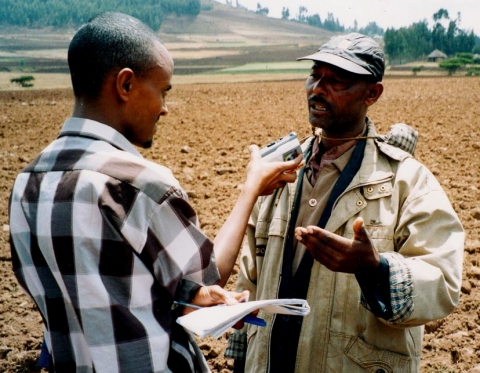
Independent journalists face new, alarming threats around the world. One reason they are at greater risk is the lack of standardized practices and coordinated efforts among governments, the news media and private organizations working to protect freedom of expression.
To address the pressing need for better security, a group of freelancers, media organizations and international organizations such as the International Center for Journalists (ICFJ), the Committee to Protect Journalists, Reporters Without Borders, the International News Safety Institute, the Dart Center for Journalism and Trauma, have drafted A Call for Global Safety Principles and Practices. The initiative, launched yesterday at Columbia University’s School of Journalism, represents a concerted move to standardize practices and coordinate efforts among governments, media organizations and other international groups to protect journalists who cover armed conflicts, organized crime and corruption.
ICFJ strongly backs this initiative and urges other organizations concerned with journalist safety to offer their support.
The Call for Global Safety Principles and Practices lays out key guidelines for international news organizations and the freelancers who work with them. Among its recommendations for independent journalists to consider before they go on assignment: Take a recognized news-industry first aid course, seek out adequate medical insurance, and work with news organizations to understand the risks of the assignment. The document also urges editors and news media to show the same concern for the welfare of local journalists and freelancers and offer them the same support they provide to staffers.
ICFJ is committed to improving journalist and blogger safety through its programs. Some examples:
- A digital security manual for journalists and bloggers in Arabic and Spanish;
- Tutorials on how to navigate the Internet anonymously, how to encrypt documents, and how to protect computers;
- An academic curriculum in Spanish offered by the University of Guadalajara on safe coverage and a guide for Mexican journalists covering organized crime, violence and corruption;
- A virtual legal clinic for Mexican and Iraqi journalists where lawyers provide pro bono advice for journalists facing subpoenas or defamation lawsuits, and guidance on how to lodge formal complaints in response to threats and attacks;
- Mapping platforms for journalists in Mexico and Iraq that track attacks on journalists and bloggers, provide safety resources and allows users to see and respond to trends.
As an ICFJ Knight Fellow focusing on the global safety of journalists, I am now developing a mobile and online app that journalists and bloggers can use to get an automatic assessment of their physical and digital security.
ICFJ believes the new initiative to create a global security standard for journalists launched Feb. 12 will strengthen the work of all those who are trying to protect journalists around the world from threats and harm.
Slider image: CC-licensed by Christian Frei Switzerland on Flickr.